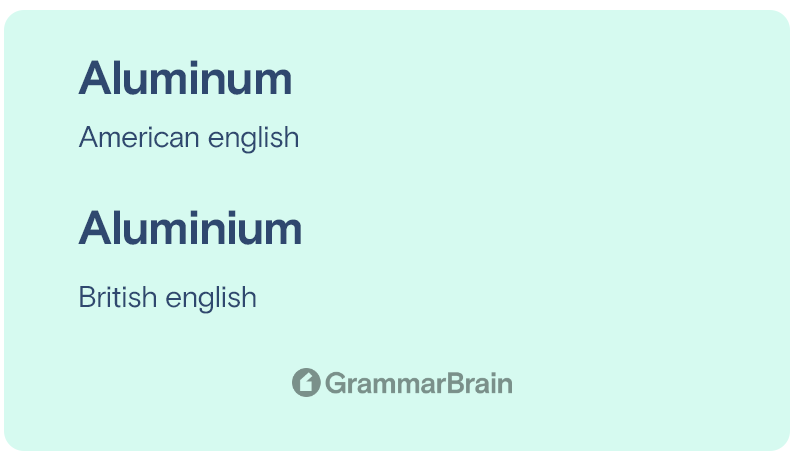Is it aluminum or aluminum? Are you wondering what that foil that you use to wrap your food called is? Should you pronounce it as an Aluminium foil or an Aluminum foil?
Well, let us look at the definitions of both words to clear the confusion up.
Differences between alumninium and aluminum
1) Aluminum
The thirteenth element on the periodic table, Aluminum, is a thin silver-metallic element. It is highly reflective and commonly used as a foil to wrap food and cover substances. It is also highly conductive, oxidation resistant, and has numerous practical applications.
2) Aluminium
Aluminium is the same as Aluminum. Except for the difference in spellings, both words refer to the same thirteenth chemical element on the periodic chart. It is the same ordinary metallic element that is found in our kitchen appliances, salon, and so on.
| Word | Use |
| Aluminum | American English |
| Aluminium | British English |
If aluminum and aluminium mean the same, why do we have two different spellings?
This confusion of spellings is not unique to these two words and is certainly not a new concept. There are discrepancies in spelling for several other words throughout the English-speaking class. For example – Familiarize/Familiarise, Enroll/Enrol, etc.

Correct spelling of aluminum
What is the right way of spelling this silver-colored metal?
There is no right way of spelling this element. Both Aluminum and Aluminium are etymologically correct spellings and are equally valid. However, each spelling is popular in different parts of the world.
History of aluminimum or aluminum
Sir Humphry Davy, a chemist in the 19th century, was determined to isolate this element that abundantly exists on Earth in the form of compounds and wished to call it ‘Alumium.’ Until then, the word Alumina, which refers to the oxide of Aluminum, was predominately used for the compound.
But unconvinced, Davy soon changed the name of this element to Aluminum. Since most chemical elements classically end with the term -ium (potassium, helium), other chemists of that time were tempted to adopt the word Aluminium to conform to the analogy of other elements.
Popularity of each word
Scientifically, the most preferred word for this metal across the globe is Aluminium, mainly because of the suffix ‘-ium’ at the end. However, The American Chemical Society and the International Union of Pure and Applied Chemistry have adopted the words Aluminum and Aluminium, respectively. So the question finally boils down to what you are comfortable calling it and how you grew up spelling the word.
Natively, Aluminum is popular in North America, and Aluminium is more common in the UK and most of the other English-speaking parts of the world. Lately, the US has progressed to adopt Aluminum over Aluminium because of the repeated occurrence of the word in daily operations.
Sentence examples using aluminum and aluminium
1) Our new house has Aluminum roof panels and siding.
2) Aluminium is the thirteenth element on the periodic table.
3) Mr. Albert uses Aluminum foil to cover his food before popping it in the microwave oven.
4) Miss Katty wants to find out the price of Aluminium cladding for her new office space.
5) Aluminum is a good conductor of electricity and is used for electrical transmissions.
Conclusion
Aluminum or Aluminum, the right way of spelling this word is however you would like to spell it. Unless you want to be careful of the use of this word in different geographies, you can be assured that both spellings are logical and accepted. The single-letter difference in both words is as good as non-existent.
Inside this article
Fact checked:
Content is rigorously reviewed by a team of qualified and experienced fact checkers. Fact checkers review articles for factual accuracy, relevance, and timeliness. Learn more.
Core lessons
Glossary
- Abstract Noun
- Accusative Case
- Anecdote
- Antonym
- Active Sentence
- Adverb
- Adjective
- Allegory
- Alliteration
- Adjective Clause
- Adjective Phrase
- Ampersand
- Anastrophe
- Adverbial Clause
- Appositive Phrase
- Clause
- Compound Adjective
- Complex Sentence
- Compound Words
- Compound Predicate
- Common Noun
- Comparative Adjective
- Comparative and Superlative
- Compound Noun
- Compound Subject
- Compound Sentence
- Copular Verb
- Collective Noun
- Colloquialism
- Conciseness
- Consonance
- Conditional
- Concrete Noun
- Conjunction
- Conjugation
- Conditional Sentence
- Comma Splice
- Correlative Conjunction
- Coordinating Conjunction
- Coordinate Adjective
- Cumulative Adjective
- Dative Case
- Determiner
- Declarative Sentence
- Declarative Statement
- Direct Object Pronoun
- Direct Object
- Diction
- Diphthong
- Dangling Modifier
- Demonstrative Pronoun
- Demonstrative Adjective
- Direct Characterization
- Definite Article
- Doublespeak
- False Dilemma Fallacy
- Future Perfect Progressive
- Future Simple
- Future Perfect Continuous
- Future Perfect
- First Conditional
- Irregular Adjective
- Irregular Verb
- Imperative Sentence
- Indefinite Article
- Intransitive Verb
- Introductory Phrase
- Indefinite Pronoun
- Indirect Characterization
- Interrogative Sentence
- Intensive Pronoun
- Inanimate Object
- Indefinite Tense
- Infinitive Phrase
- Interjection
- Intensifier
- Infinitive
- Indicative Mood
- Participle
- Parallelism
- Prepositional Phrase
- Past Simple Tense
- Past Continuous Tense
- Past Perfect Tense
- Past Progressive Tense
- Present Simple Tense
- Present Perfect Tense
- Personal Pronoun
- Personification
- Persuasive Writing
- Parallel Structure
- Phrasal Verb
- Predicate Adjective
- Predicate Nominative
- Phonetic Language
- Plural Noun
- Punctuation
- Punctuation Marks
- Preposition
- Preposition of Place
- Parts of Speech
- Possessive Adjective
- Possessive Determiner
- Possessive Case
- Possessive Noun
- Proper Adjective
- Proper Noun
- Present Participle
- Prefix
- Predicate



